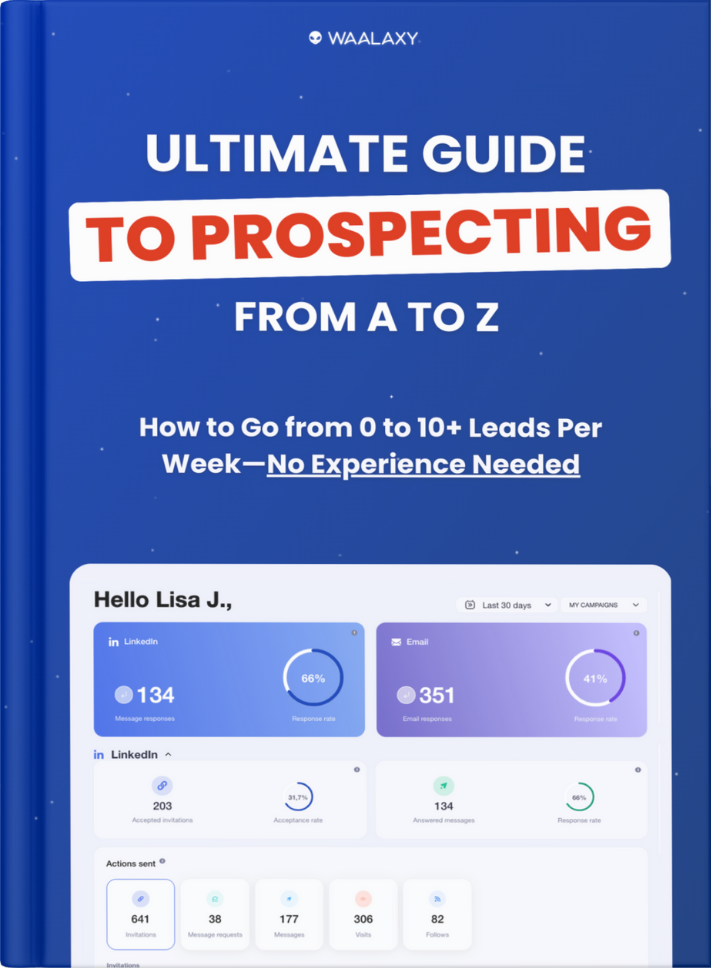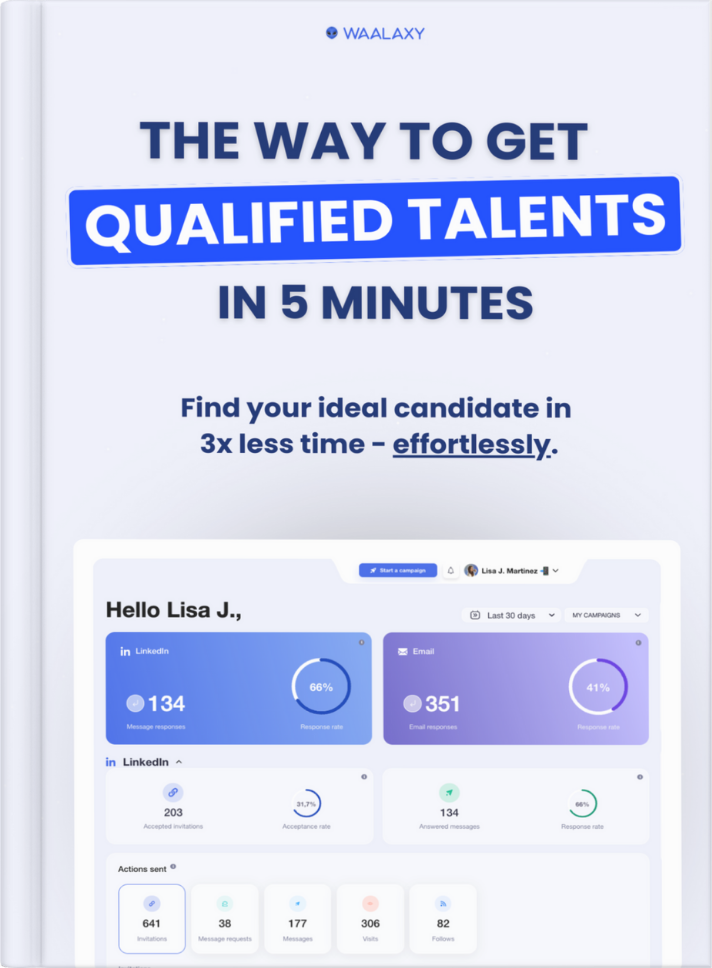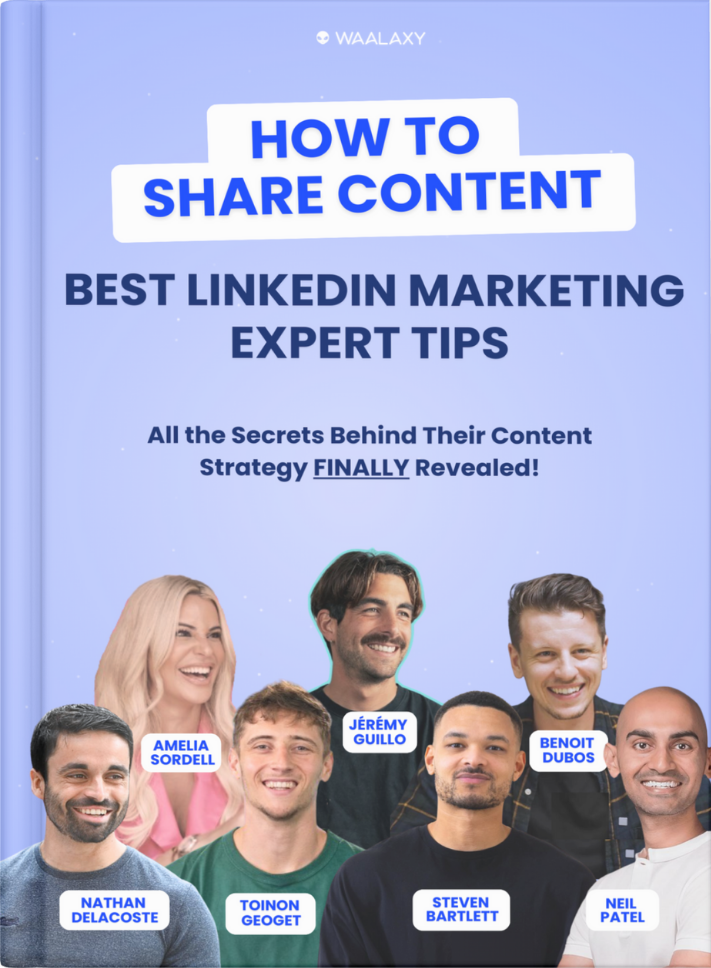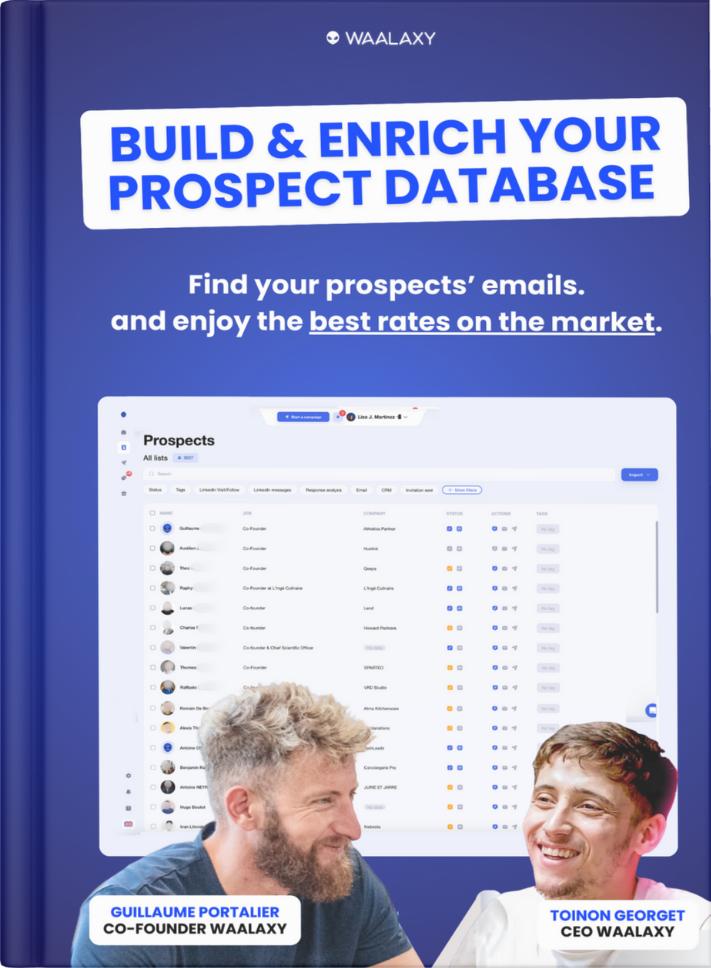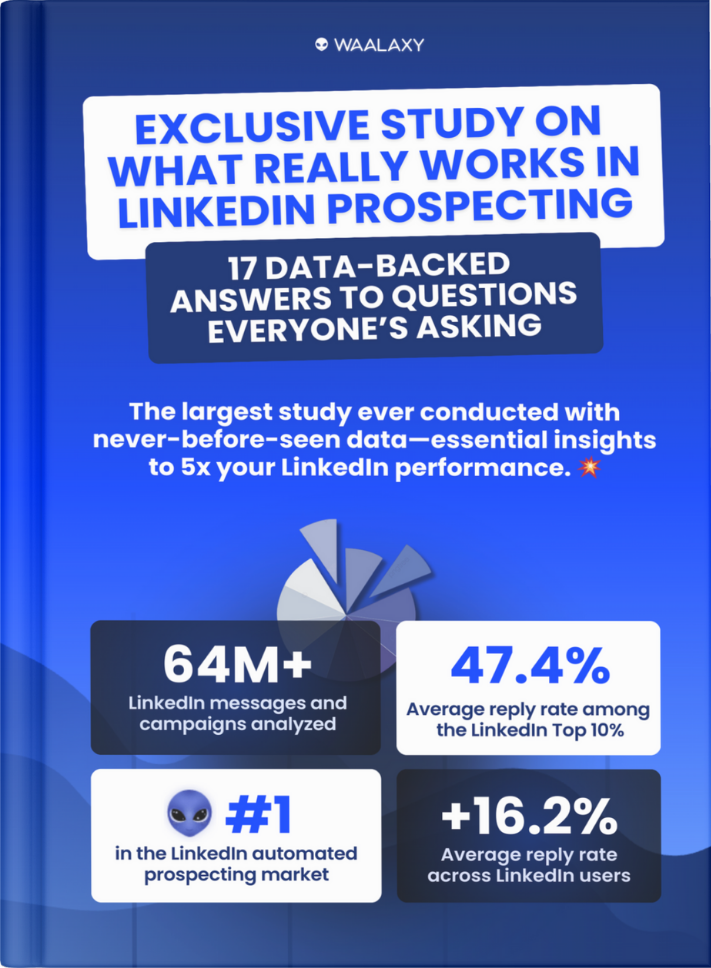6sense reviews, you’ve probably heard of it if you’re interested in ABM (Account-Based Marketing) or B2B prospecting, or if you’ve done any research about 6sense reviews or 6sense alternatives.
It’s the kind of tool that tells you: ⤵️
- Which accounts are going to buy, even before they turn on their computers.
- Where to focus your marketing and sales efforts.
- How to identify the right signals, at the right time so you stop wasting money.
So yes, on paper, it sounds dreamy. 💭
But does the platform really deliver? Is it the right fit for your company? Are there simpler and more affordable alternatives to 6sense?
That’s exactly what we’re breaking down today in this article. 🖋️
A useful and sincere guide, because choosing tool is an investment and it’s better to know what you’re paying for. 👀
Grab yourself a hot chocolate, get comfortable, here we go! ☕️ (Reading time: 12 minutes)
What is 6sense?
6sense is an ABM (Account-Based Marketing) platform that combines artificial intelligence, behavioral data, and intent signals to help you detect accounts that are likely to buy earlier.
Instead of waiting for prospects to fill out a form, the tool allows you to identify those who are already looking for a solution like yours, even if they’ve never contacted you.
The goal is for your marketing team to know where to focus their campaigns and for your sales reps to stop spending time on lukewarm leads.
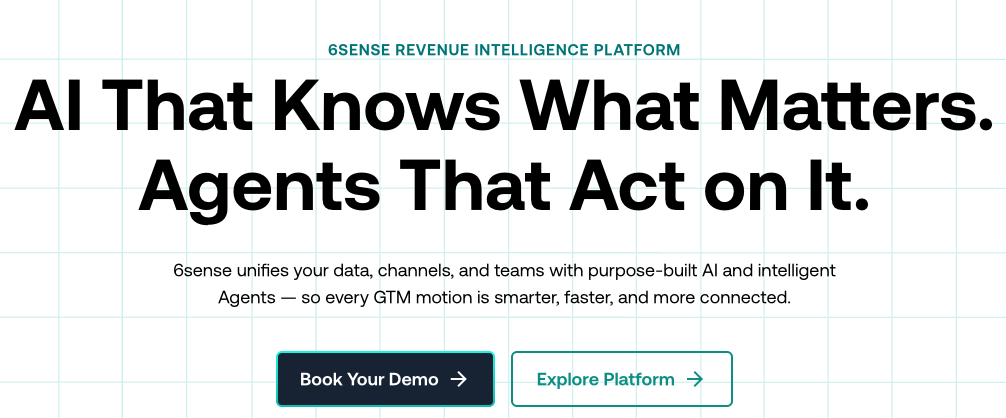
The tool relies on several elements:
- The analysis of the “dark funnel” includes everything that occurs before a prospect contacts you, such as searches, anonymous visits, and weak signals.
- Account and contact data enrichment.
- Automatic account scoring to prioritize the highest potential ones.
- Multichannel campaign orchestration (emails, advertising, LinkedIn, etc.).
- CRM and sales tool to maintain fluid data.
The tool launched in the United States and is now used by companies like Cisco, Zendesk, and Genesys, with a premium positioning.
The tool targets marketing, sales, and revenue operations teams around one same objective: better targeting and better selling.
All of this comes at a cost. It’s not necessarily the most suitable tool if you’re an SMB, a startup or if you’re just getting started with ABM. 👀
Key features of 6sense reviews
6sense sells itself as a complete suite that can support your ABM strategy from A to Z. Let’s take a closer look. 🔎
1️⃣ Identification of anonymous accounts (Dark Funnel)
The tool analyzes buying behaviors outside your usual visibility:
- Google searches.
- Anonymous visits on your website.
- Content is read on external platforms.
This lets you detect accounts that are interested in solutions like yours even before they raise their hand.
2️⃣ Predictive scoring and account prioritization
Thanks to its artificial intelligence engine, the tool applies a score to accounts based on:
- Their level of intent,
- Their buying stage,
- Their engagement level.
You can then prioritize those with the highest conversion potential. 🔄
3️⃣ Creation of multichannel campaigns
The tool allows you to create engagement scenarios across multiple channels:
- Emails.
- LinkedIn Ads.
- Display.
- Retargeting.
- Sales calls.
These campaigns are automatically triggered based on account behavior. 👀
4️⃣ Personalization of content and web pages
6sense can adapt the messages displayed on your website depending on the identified visitor’s profile:
- Industry.
- Company.
- Job title.
- Maturity level.
This increases engagement and conversion.
5️⃣ Alerts and insights for Sales teams.
Your sales reps receive real-time alerts when a key account shows intent signals.
They can then engage at the right time, with the right message, thanks to the platform’s insights. 👀
6️⃣ Integration with Sales and Marketing tools
As you can imagine, the tool integrates with Salesforce, Hubspot, Outreach, Marketo, Eloqua, etc.
It also integrates intent data, scoring and accounts to prioritize. 😇
6sense customer reviews: what users are saying
So, what do customers think? 🤔
We analyzed customer reviews from different platforms and grouped them all into this table. ⤵️
| Pros | Cons |
|---|---|
| The product provides valuable insights into accounts during the buying phase. | High price, not adapted to small structures. |
| Enables strong marketing/sales alignment. | Long learning curve. |
| Powerful multichannel prospecting (email, ads, web…). | Some intent signals were judged unreliable or too generic. |
| Smooth CRM (Salesforce, HubSpot) for large accounts. | Dense UX, not always intuitive. |
| Real-time alerts are useful for SDRs. | Support is sometimes considered slow or not personalized. |

What is the 6sense reviews pricing?
6sense’s does not display its prices directly. But don’t worry, we investigated on our side. 👀
The information comes from the official website as well as third-party data, especially from Vendr, which analyzes hundreds of B2B SaaS purchases.
First, here’s a clear table to understand the different 6sense plans and their positioning. ⤵️
| Plan | What you get | Indicative price |
|---|---|---|
| Free Plan | Basic access with 50 data credits/month, company & contact search, list builder, sales alerts, and Chrome extension. | Free. |
| Sales Intelligence + Data Credits | The services offered include company and contact acquisition, data enrichment, technographic and persona insights, website visitor identification, and workflow automation. | Between $12,500 and $60,000/year. |
| Sales Intelligence + Predictive AI | AI-based prioritization with predictive scoring, dashboards, Sales Copilot, and workflow tools. | Median: $55,211/year. |
| Sales Intelligence + Data Credits + Predictive AI | Full offer: enrichment, AI scoring, dashboards, and Sales Copilot for highly targeted prospecting. | Up to $130,000/year. |
According to Vendr data, the median price is $55,211/year, but it can range from $12,502/year to $130,483/year, depending on the customization level and usage volume.
Basically, if you’re an SMB or startup with a limited budget, 6sense might be too large an investment.
The 7 best 6sense competitors alternatives
That’s why we tested 7 other tools, just for your beautiful eyes. 👀
1. 6sense reviews vs Waalaxy
Waalaxy is a French all-in-one multichannel B2B prospecting tool (LinkedIn + Email), designed to allow small and medium businesses, agencies, or sales teams to:
- Target and enrich their leads.
- Launch cold outreach campaigns on LinkedIn and by email.
- Track performance in real time.
- Automatically sync leads to their CRM.
- Basically, it’s ideal for operational without deploying an army of consultants. 🪖
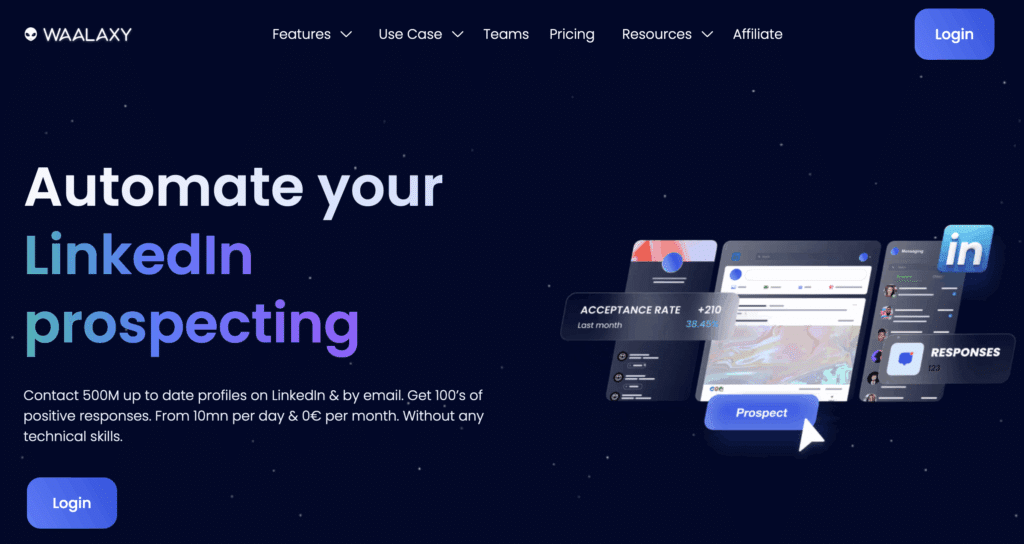
The tool mainly targets freelancers, B2B prospecting agencies, startups, and marketing/growth teams.
Here is the detail of what Waalaxy offers (careful, it’s heavy):
- Multichannel LinkedIn + email prospecting: directly from a Chrome extension.
- 1-click scraping and import from Sales Navigator, LinkedIn, Recruiter, CSV, posts, groups, etc.
- Built-in email with a +60% average match rate, thanks to triple automatic verification (Dropcontact, BetterContact, Fullenrich).
- List segmentation and simple scoring via tags, campaigns, and behaviors.
- We conduct A/B testing for different sequences to compare the most effective messages.
- Integrated LinkedIn inbox to follow and relaunch conversations.
- Performance dashboard (open rate, reply rate, conversion rate, bounce rate).
- Native CRM integrations (Salesforce, HubSpot, Pipedrive) and 2000+ apps via Zapier/Make.
- Automatic duplicate removal and reply detection.
- Responsive human support, even on the Freemium version.
- An app is available in 11+ languages for your international teams.
If 6sense targets highly structured companies with significant budgets, Waalaxy positions itself as a more accessible alternative with a simpler interface, without sacrificing performance.
What do Waalaxy users say? 🤔
| Advantages | Disadvantages |
|---|---|
| Simple interface and easy to use. | No advanced predictive scoring. |
| Very good enrichment rates. | Requires Chrome to work. |
| Native multichannel LinkedIn + email. | Freemium plan limited in volume. |
| Native CRM sync. | Some advanced features are reserved for higher plans. |
| Very responsive customer support. | Does not manage the “dark funnel” or intent signals like 6sense. |

How much does Waalaxy cost? 🤔
Monthly
Quarterly
Yearly
Without Inbox
With Inbox
Add-on
Even on the highest plans, Waalaxy remains 4 to 6 times cheaper than 6sense. 💸
2. 6sense vs Demandbase
Demandbase is an ABM tool designed for marketing and sales teams of B2B companies. It notably offers:
- Intent detection.
- Multichannel engagement.
- Web personalization.
- Account orchestration.
- CRM integration/automation.
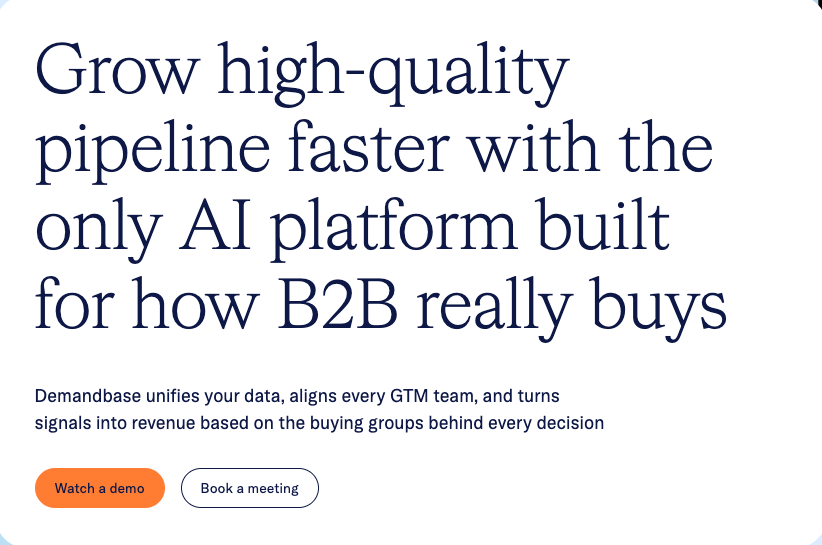
The tool targets medium- to large-sized marketing teams, companies with complex sales cycles, and teams working on targeted accounts.
Here are the features Demandbase offers:
- Identification of hot accounts.
- Predictive scoring of accounts.
- Cross-channel marketing.
- Personalization of web content.
- Alerts for sales teams.
- CRM and marketing tool integration (Salesforce, HubSpot, Marketo…).
- Access to behavioral intent signals.
- Buying journey analysis and reporting.
What do customers say? 🤔
| Strengths | Points to watch |
|---|---|
| Great depth of insights → elevated targeting of accounts and buying groups. | High pricing and a longer ROI cycle for smaller budgets. |
| Strong multichannel orchestration & marketing-sales alignment. | Steep learning curve and relatively long implementation. |
| Recognized intent data & dedicated support. | Complexity for teams without ABM maturity or clean data. |

As for pricing, Demandbase does not display standard rates; each offer is customized based on modules, number of users, target accounts, etc.
However, after some research, here is what we found. ⤵️
| Platform + user seat | Quoted price after negotiation: ≈ $99,000/year for a contract with “Platform Fee + 2 add-ons.” |
| Median investment | Around $65,000/year for a mid-sized business. |
| Typical spending range | • Small businesses: ≈ $18,000–$32,000/year. • Mid-market: ≈ $43,000–$61,000/year. • Large enterprises: often more than $100,000/year. |
3. 6sense abm reviews vs ZoomInfo Intent
ZoomInfo Intent is a module of the ZoomInfo platform that detects “in-market” accounts through intent data (anonymous web visits, content engagement, technologies used, etc.).
It primarily targets sales and marketing teams, especially those already using a CRM.
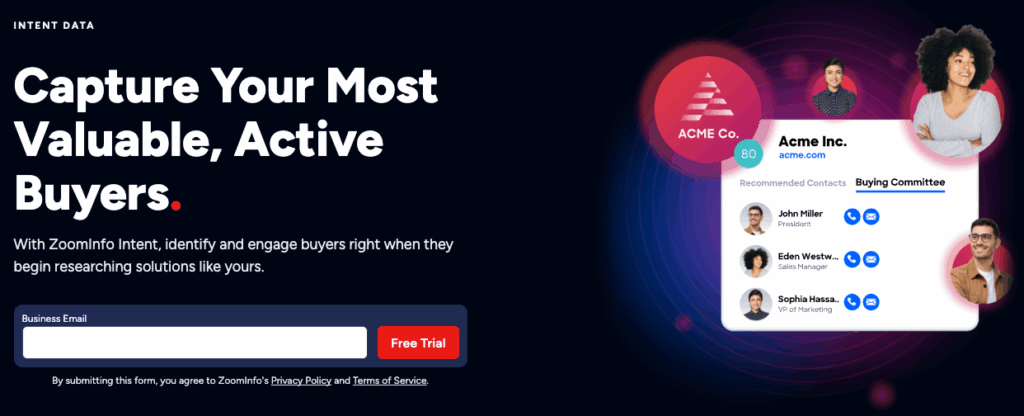
Let’s see the features:
- Identification of “in-market” accounts via intent signals (anonymous visits, solution research, and content consumed).
- Scoring and prioritization of accounts ready to buy.
- Integration of data into your CRM/marketing tools (alerts for reps, etc.).
- Firmographic and technographic enrichment.
- Tracking of trigger events on targeted accounts.
What do users says? 🤔
| Strengths | Weaknesses |
|---|---|
| Very large database. | Quality of signals sometimes criticized (false positives). |
| Strong CRM stack integration. | Pricing model not transparent + hidden fees. |
| Helps align marketing & sales around account targeting. | Implementation complexity requires internal maturity. |

Like the others, ZoomInfo does not list its prices directly on the landing page.
However, here is what I found:
- Entry-level plan estimated at around $15,000/year for a small team.
- For more advanced offerings (intent + enrichment + user licenses), this rises to $25,000/year, or even $40,000/year or more, depending on the users.
- Costs vary greatly depending on the number of licenses, data credits, and add-ons.
4. 6sense software vs Bombora
Bombora is software specialized in B2B intent data.

Basically, if your potential customers research solutions before contacting you, the tool captures these signals (dark funnel), identifies companies in an active buying phase, and allows you to launch targeted actions. 🎯
The tool targets marketing and sales teams who want to enrich their stack with intent data and quickly identify “in-market” accounts.
Regarding features, the software offers:
- Identification of “in-market” accounts via activity spikes (“surge”) on relevant topics.
- Database with many topics (12,000+ subjects) and tracking of billions of B2B consumption events.
- Integration with CRM/automation (Salesforce, HubSpot, Marketo…) to export accounts to take action on.
- Mix of data and enrichment: firmographic, technographic, potential churn tracking, etc.
- Firmographic and technographic enrichment based on intent.
Customer reviews G2 we found. ⤵️
| Advantages | Inconveniences |
|---|---|
| Intent data helps identify accounts in the active phase. | Lack of granularity on which individuals are concerned inside the company data. |
| Smooth integration with Salesforce and HubSpot. | Intent signals are not always immediately actionable. |
| Useful weekly “Company Surge” reports to prioritize. | Cost remains high for SMBs, or small teams. |
| Good coverage of topics and verticals. | Learning curve to fully use all modules. |

Concerning the pricing, like the other tools, the software does not display prices directly on the website.
After digging further, here is what I found. 👇🏼
| Service level | Estimated price |
|---|---|
| Median value. | ≈ $25,000/year. |
| Low range. | ≈ $13,750/year. |
| High range (mid-market). | ≈ $50,000–$100,000/year. |
| Large enterprise/full deployments. | > $100,000/year. |
No standard pricing grid exists; each contract is customized.
5. 6sense reviews alternative: Cognism
Cognism is a B2B data tool specialized in enrichment and lead generation, designed to help sales teams target the right leads with reliable, GDPR-friendly data. 💬
The tool targets sales teams, fast-growing startups, and companies that want to go fast without spending 3 hours verifying their CSV files.

If you need direct phone numbers, verified professional emails and fresh data, this is the right place. 👀
Features:
- Access to a global B2B database → +400 million verified profiles.
- Direct data → direct phone numbers, professional emails, and firm info.
- Filters → location, company size, technology used, etc.
- Chrome extension to capture leads from LinkedIn in 1 click.
- Sales Triggers → buying signals (hiring, fundraising, etc.).
- CRM & sales tool integrations → HubSpot, Salesforce, Outreach, etc.
And all this with GDPR compliance, even for European markets.
Let’s see what we found about customer reviews. ⤵️
| What they like | What they criticize |
|---|---|
| Contact data is often accurate, especially phone numbers. | Price is high for small teams, especially with low usage. |
| Good CRM integration, smooth synchronization. | Learning curve if you start from zero (some minor bugs). |
| Very responsive customer support. | Less reliable data in some countries outside the US/UK. |
| Precise filtering to target the right accounts. | Analytics could be more advanced. |

About the pricing, they are not public (again) and depend on volume, number of users, and options chosen.
However, we have a little more detail here! ⬇️
Here are the amounts seen from customer feedback, between €10,000 and €25,000/year.
6. 6sense reviews alternative: Clearbit
Clearbit is a B2B enrichment tool that helps you better understand your leads, your anonymous visitors and your customers. 🧢
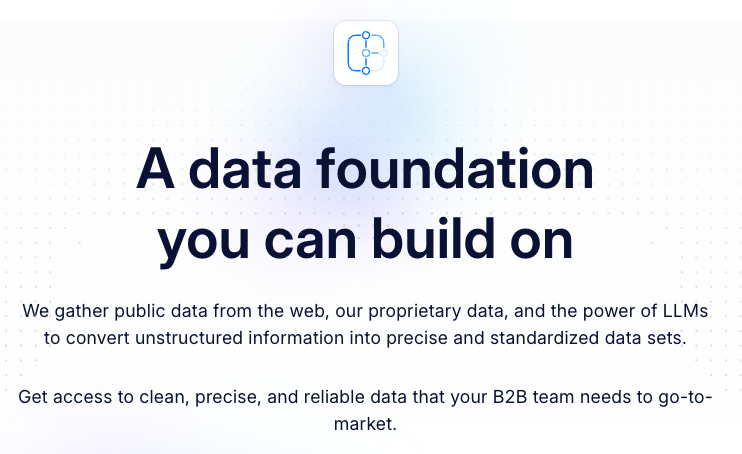
It is mainly used to:
- Automatically enrich your contact databases.
- Identify companies that visit your website.
- Prioritize your leads based on their fit.
- Personalize your marketing campaigns.
The software targets startups and marketing teams with existing experience.
Features:
- Enrichment of profiles from an email or domain.
- Identification of anonymous visitors on your site.
- Detection of buying intent signals.
- Automatic lead scoring.
- Native integration with Salesforce, Hubspot, Marketo, etc.
- API to enrich your own tools in real time.
- Form enrichment (form autofill).
- Detection of technologies used by your visitors.
- Advanced filters to refine your ICP.
Let’s see the customer reviews. ⬇️
| Strengths | Weaknesses |
|---|---|
| Very easy-to-use tool. | High cost if you have large data volumes. |
| Robust API for real-time enrichment. | Not an activation tool (data only). |
| Automatic enrichment saves time. | Data is sometimes incomplete or inaccurate. |
| Good customer support. | Not ideal for small structures. |

Like all the others, there are no publicly displayed prices, but after some research and a few gray hairs:
- Simple plan for startups: starting at $30 to $50/month (limited features).
- Enterprise plans: between $17,000 and $80,000/year depending on data volume and desired integrations.
You’ll need to contact their team to get a demo and a personalized quote.
7. 6sense sales intelligence vs D&D Hoovers
D&B Hoovers is a commercial intelligence platform developed by Dun & Bradstreet, specialized in access to reliable data at large scale. 🪜
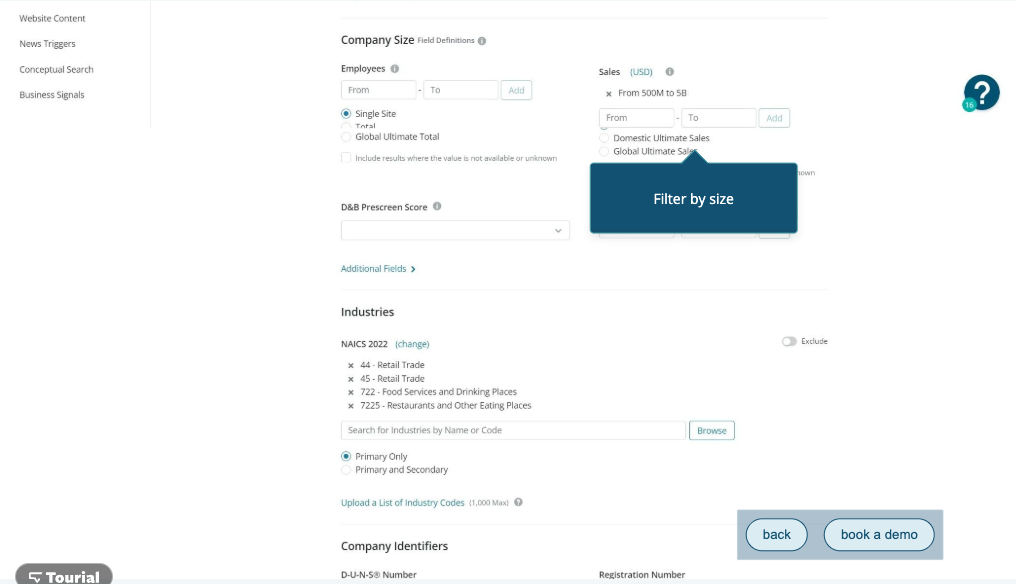
It allows companies to identify, segment, and qualify high-potential accounts thanks to a global database of millions of companies and decision-making contacts.
The tool targets sales and marketing teams already using a CRM who want a global and exhaustive company database.
Features:
- Advanced company search and segmentation (size, geo, industry, cost, etc.).
- Updated contact lists inside these companies (decision-makers, specific roles).
- Financial & firmographic data for each company.
- Trigger alerts: a company changes technologies or leaders or raises funds.
- Direct export to CRM or prospecting tools.
- API and synchronization to automate enrichment.
- International coverage (D-U-N-S® number included).
- Data cleaning & management to keep a clean database.
What about customer reviews? 🤔
| Strengths | Weaknesses |
|---|---|
| Very complete company database, ideal for “account research.” | Interface a bit outdated, according to some users. |
| Often accurate firmographic and contact data. | Price can rise if you want all modules and export options. |
| Good filtering to find prospects with precise criteria. | No native multichannel orchestration (email + LinkedIn + ads). |
| Useful trigger function to detect changes in accounts. | Requires an initial data cleaning to avoid duplicates. |

When it comes to pricing, we don’t change a winning team, so prices are not publicly displayed. Waalaxy is definitely the only one offering this 😅.
According to customer reviews:
- Entry price: several tens of thousands of dollars per year for corporate use.
- For large volumes and mass exports, the budget can increase significantly.
How to choose a good marketing intelligence tool (and avoid the traps)?
Ok, you’ve seen all the alternatives, the comparison tables, the customer reviews, and now what? 🤔
It’s not easy to navigate the jungle tools and intent platforms.
So here is a clear list to choose wisely, without spending your nights on it (and without blowing your budget). 🤑
1) Define your precise objectives
Before pulling out your credit card, ask yourself the following question:
“Why do you want an ABM tool or intent signal platform?”
Some valid objective examples:
- Identify hot accounts visiting your site.
- Help your sales reps prioritize the right targets.
- Coordinate your campaigns between marketing and sales.
- Avoid buying leads that will sleep in a corner.
The more vague your objectives, the more likely you are to choose the wrong tool.
2) Check compatibility with your current tools
Already using HubSpot, Pipedrive, Salesforce, or Marketo? Great, unless your new tool takes 6 months to integrate, you may quickly regret it. 😅
So, no panic, just make sure the tool offers:
- Native integrations (Hubspot, Salesforce, etc.).
- An open API to automate if needed.
- Zapier/Make connectors if your software allows modifications.
3) Analyze data quality
A nice tool is good, but good data is better. 😇
Here’s how to quickly test the quality of a tool:
- 🔵 Do a test with a file of 100 accounts.
- 🔵 Check match rates (emails, signals).
- 🔵 Verify data freshness (date, source).
- 🔵 Evaluate the relevance of intent signals.
4) Analyze the total cost
A tool can seem cheap until you add:
- 🟣 Mandatory modules.
- 🟣 Activation fees.
- 🟣 Custom CRM.
- 🟣 Consulting.
Always compare the full cost over 12 months, not just the monthly price displayed.
And should we recap about 6sense reviews?
If you’re a company with:
- A long sales cycle.
- Several personas to manage
- Large marketing/sales teams to align.
Then yes, 6sense has something to interest you. But if you’re looking for a simple tool, quickly actionable, that does not require 4 months of onboarding and a 6-figure budget, you’ve noticed that other solutions do the job perfectly. 👀
Waalaxy, Clearbit, Cognism, ZoomInfo Intent, each have their strengths, sometimes more adapted to your maturity, your processes and your budget. 👀
The right tool is the one that meets your concrete needs, not the one that shines in demos.
So now, take the time to test, compare and choose a tool your teams will actually use. 💻
Also People Ask
There are still 3 questions that come up quite often.
Where is 6Sense based?
6sense is an American company whose headquarters is located in San Francisco, California. 🇺🇸
It was founded in 2013, and today it operates internationally, with customers mainly in the United States but also in Europe, Australia and Asia. 💭
What is 6sense used for?
6sense identifies accounts in a buying phase before they contact you. 👀
It collects intent signals (searches, anonymous visits, and content read), associates them with companies, and scores them according to their maturity.
Result: you know who to target, when, and how. 🔎
Then, you can automate your actions (email automation, ads, sales alerts, website personalization…) depending on what each account does.
Everything is synchronized with your CRM tools like HubSpot or Salesforce so that marketing and sales work hand in hand.
Is 6sense a reliable source?
Very good question. When we talk about behavioral data, GDPR (and CNIL) are never far away. 👀
Here is what to remember:
- 6sense relies on B2B data, aggregated by company domain (e.g., company.com) rather than directly by individual.
- The platform does not exploit personal data illegally, but it can enrich and cross-reference information from public sources, partners, or third-party data vendors.
- In Europe, using the tool often requires a specific configuration (cookie banner, consent, hosting, etc.) to remain compliant.
I think you now know everything about the 6sense reviews tool and its alternatives.
See you soon! 👋


